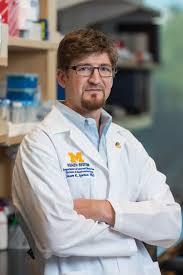
Chung Owyang
Professor of Internal Medicine and H. Martin Pollard Collegiate Professor. He is also the Division Director of Gastroenterology at the University of Michigan Medical School. Dr. Owyang’s research interests focus on neurohormonal control of digestive functions including pancreatic endocrine and exocrine secretions, gastrointestinal motility and eating behavior. His identification of a novel peptide, “CCK-releasing peptide”, changed the understanding of hormone secretion during feeding and provides the mechanism responsible for feedback regulation of pancreatic secretion. This forms the theoretical base for using pancreatic enzymes as a treatment for pain in chronic pancreatitis. His studies on the brain-gut axis clearly established the vagal nodose ganglia as a target for hormones to mediate digestive function. These observations changed the understanding of how hormones act to modulate pancreatic secretion and motility. At the enteric nervous system level, Dr. Owyang investigates the synaptic connections between major groups of stimulatory and inhibitory neurons, which are responsible for forming motility patterns in the different regions of the GI tract. A clear understanding of this neural network is critical to examine how these connections can be changed in disease processes or disorders. Recently Dr. Owyang and his colleagues have begun to investigate the mechanisms governing glucose sensing and peptide secretion by enteroendocrine cells including novel taste-like pathways. These studies may provide promising targets for new strategies to combat obesity and diabetes.

Linda Samuelson
Dr. Samuelson is Professor of Molecular & Integrative Physiology at the University of Michigan Medical School. Her research program is focused on the development and function of the gastrointestinal system, with emphasis on the mechanisms regulating epithelial cell identity in stomach and intestine. In the gastrointestinal tract, stem cells continually form and replenish the epithelium throughout the lifespan of the organism. Our studies are probing a number of pathways that regulate epithelial cell maturation and function. These studies take advantage of genetically engineered mouse models as well as in vitro approaches to investigate the significance of these pathways for regulation of proliferation and differentiation. Training experiences in the laboratory are enhanced through active participation in the “UM Gut Group”, which includes a number of well-funded molecular gastrointestinal research laboratories. Current projects are focused on understanding the molecular mechanisms regulating gastric parietal cell formation and function, and the pathophysiological consequences of inflammation in the stomach that are associated with the development of gastric cancer. In addition, we have recently demonstrated that Notch pathway signaling is required for gastric and intestinal epithelial cell proliferation and differentiation, and have identified several critical regulators and effectors of Notch action in the gastrointestinal tract. Understanding pathways regulating proliferation and differentiation will establish critical targets for enhanced diagnosis and the future design of therapeutic interventions to treat epithelial cell atrophy and gastrointestinal cancer.

Jason Spence
Dr. Spence is Assistant Professor of Cell & Development Biology at the University of Michigan Medical School. The Spence laboratory uses human pluripotent stem cells to generate 3-dimensional tissues in the tissue culture incubator. For example, we generate intestinal tissue, called human intestinal organoids (HIOs) and lung tissue, called human lung organoids (HLOs) in order to study human development, differentiation and disease. Using these systems, a variety of studies in the laboratory are underway including: understanding how human organs develop and mature; understanding stem cell dynamics in complex systems; modeling complex biological problems in vitro (ie/ host-microbe interactions); and finally, understanding the molecular mechanisms driving 3D shape (organoid) formation.
The laboratory also uses model organisms to explore the molecular mechanisms that control embryonic development. By understanding how the embryo develops, we gain insights into how abnormal development can lead to congenital disease, or how developmental regulators are involved in regeneration, injury repair or disease in the adult.
